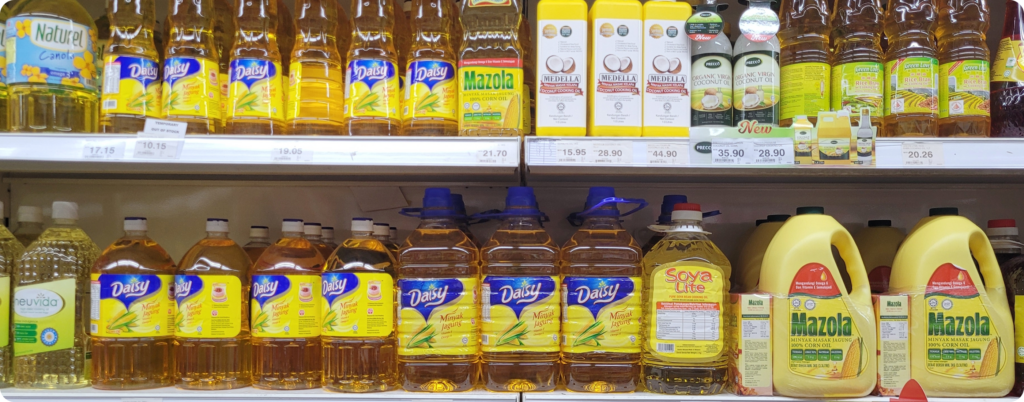PLEASE NOTE: The information in this blog is for educational purposes only. It is not a substitute for professional medical advice. Consult your healthcare provider if you’re seeking medical advice, diagnoses, or treatment.
Canola oil is very controversial in the health world.
If you type “is canola oil bad for you?” into Google, you’ll see one side claiming it’s the healthiest cooking oil on the market while the other side views it as industrial sludge.
The answer to who’s correct has yet to be settled, but this article will walk you through the good, the bad, and the ugly of canola oil.
What is Canola Oil?
Canola is a bright yellow plant of the Brassicaceae family, originating in the Mediterranean and Northern Europe (1). Canola oil emerged from Canada in 1974 through genetic modification of rapeseed oil (2). These oils are closely related, but canola oil is lower in erucic acid and has a more pleasant, marketable name.

In order to extract canola oil, crushed canola seeds are heated in a hexane solvent or are cold pressed. It then goes through a process of filtration and deodorizing (3).
After palm and soybean oil, canola oil is the 3rd most popular vegetable oil used globally (4). The estimated US per capita canola oil consumption grew 167 times from its introduction in 1986 to 1999 (5).
Canola oil is popular as a cooking oil, and it’s frequently used in cookies, pizza, salad dressing, bread, chips, and other packaged foods (6).

Canola oil is a source of monounsaturated fatty acids (like oleic acid) and polyunsaturated fatty acids like alpha-linolenic acid (ALA)(7). Studies on the Mediterranean diet have concluded that oleic acid is cardioprotective (8). Other proclaimed benefits of canola oil relate to diabetes, heart health, and kidney health (9).
The fatty acid composition of canola oil is 50-70% oleic acid, 15-30% linoleic acid, and 5-14% linolenic acid (10). Compared to other seed oils, canola oil has less linoleic acid. This is important because excess amounts of linoleic acid may contribute to diseases like obesity.
This oil is a very recent addition to the human diet and is often used as a low-cost alternative to olive oil.
Why Is Canola Oil Bad For You?
Canola oil is generally regarded as safe and healthy, but there are many problems with this line of thinking. These include:
- Animal fats are not as dangerous as they’ve been made out to be
- Many studies on the benefits of canola oil are flawed
- Animal studies on canola oil indicate potential problems for humans
- Canola oil production involves pesticide usage and can harm the environment
- Essential nutrients can be lost during processing
- Labels for canola oil have misleading loopholes
- Repeatedly used canola oil in fryers can create harmful substances
So, numerous challenges can make canola oil unhealthy.
Canola Oil vs Animal Fat
One of the main reasons for including canola or other seed oils was the supposed dangers of saturated fat. Dietary guidelines have existed for decades, calling for decreased consumption of traditional fats like butter, lard, or tallow as they were thought to increase the risk of cardiovascular disease and other challenges.
However, these concerns haven’t stood the test of time.

A review from 2020 concluded that “there is no robust evidence that current population-wide arbitrary upper limits on saturated fat consumption in the United States will prevent cardiovascular disease (CVD) or reduce mortality” (11). Their findings also did not support the benefits coming from consistent canola oil consumption.
Another study from 2016 noted that “no randomized controlled trial has shown that replacement of saturated fat with linoleic acid significantly reduces coronary heart disease events or deaths” (12).
A study on Australian adults determined that choosing vegetable oils in place of animal fats doesn’t necessarily reduce the risk of cardiovascular disease (13).
While canola oil is lower in omega 6’s than many other seed oils, the typical Western diet generally contains an excessive amount to begin with (14).
The ratio of omega-6 to omega-3 consumption by humans was around 4:1 (or less) until about 100 years ago (15). Current estimates differ, but this ratio is anywhere from 15-20:1 (16, 17) or up to 50:1 (18). Americans are estimated to consume 40 grams of vegetable oil daily (19)!
Animal fats like butter and tallow offer an omega 6 to 3 ratio much closer to what humans have consumed for thousands of years (20).
Problems With Canola Oil Studies
The risks and benefits of seed oil consumption are viewed as controversial (21). Here are some notable findings:
- Clinical trials have examined the impact of canola oil on body composition with inconsistent results (22)
- Based on the limitations of current evidence, the idea that linoleic acid drives inflammation “cannot be fully rejected” (23)
- Canola and other refined oils may contribute to gut inflammation (24)
No scientific study is perfect, but studies claiming the benefits of canola oil are commonly conducted over short periods or small sample sizes for participants (25, 26, 27). Some studies are even funded by major players in the canola oil industry, such as the U.S. Canola Association and the Canola Council of Canada (28).
When you actually look into most pro-canola oil studies, it’s easy to cast doubt on the findings.
Canola Oil Animal Studies: Troublesome Findings
Numerous animal studies have found harmful effects related to the consumption of canola oil:
- Rats with chronic exposure to a canola-rich diet showed a significant increase in body weight and working memory impairments (29)
- A study on rats given canola or soybean oil showed increased levels of oxidative stress (30)
- Rats with a high canola oil intake for 10 weeks showed increased endothelial dysfunction and adipose tissue (31).
However, these findings are not always applicable to humans and must be interpreted cautiously, but they can shed light on the need for further research.
Environmental Concerns for Canola Oil
Today, over 90% of the acreage for canola crops is genetically engineered to resist herbicides like glyphosate. A study of canola populations in North Dakota showed that feral populations are widespread and may harm native populations (32).

Another environmental concern is that bees and other pollinators use rapeseed as it’s abundant in pollen and nectar. Exposure to pesticides can spell trouble for bees.
Bees can collect pesticides, heavy metals, and other contaminants (33). Pesticide poisoning is thought to be a primary cause of declining honey bee populations, and exposure can reduce population growth for generations (34, 35).
One study out of China (a major canola oil producer) found 48 pesticides in all pollen samples and 34 in nectar samples (36). The US also uses large quantities of pesticides, with over 1 billion pounds used yearly (37).
Labeling Loopholes & Loss of Vitamins
Ingredient labels with canola oil can also be misleading.
For example, without laboratory testing, it may be impossible to figure out the PUFA content in products containing canola oil, like chips, salad dressings, or bread (38). Some canola brands don’t even contain vitamin E, beta carotene, and other naturally occurring nutrients, while potentially harmful oxidized products remain (39).
Canola oil can also contain trans fat, even though it’s often labeled as free from trans fat. In the US, any trans fat value below 0.5 g per serving can be labeled as 0 g trans fat per serving. The average serving size for cooking oils is 14 grams, meaning the amount of trans fat is about 3.6% (40).
Industrial trans fats are connected to an increased risk of coronary heart disease and other complications (41). Health agencies such as the World Health Organization recommend that less than 1% of your total energy intake comes from trans fats (42).
Hazardous Byproducts of Canola Oil

Canola oil is a popular choice for restaurants. It’s common to repeatedly use the same cooking oil to reduce costs, yet foods cooked in this manner are viewed as a serious health hazard (43).
Consumption of repeatedly heated cooking oil is connected to increased blood pressure and risk of cardiovascular disease (44).
Animal fats primarily contain saturated fat and do not react as easily to chemicals like oxygen (45).
Canola Oil is Far From Perfect…
Aside from being found in nutrient-devoid, highly processed foods, canola oil is often reused in restaurant fryers, leading to harmful byproducts. Studies touting the benefits often have glaring flaws or show conflicting results.
Canola oil appears to be one of the least problematic seed oils and can offer some benefits, but there are still better options.
To minimize the potential consequences of canola oil, use traditional fats such as butter, tallow, or ghee. Do your best to avoid highly processed food and steer clear of fried foods.
Promote Healthy Weight Management
Metabolism. Energy. Drive.
Subscribe to future articles like this:
